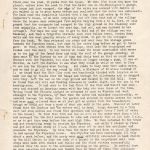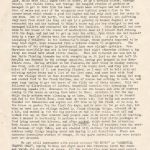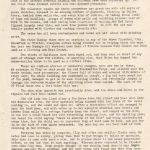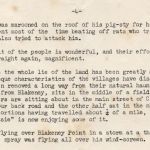This letter was written by Joan Barclay about her experience of the 1953 flood in Wiveton. She was the great aunt of Alice Atkinson who has kindly given the society permsission to use the letter.
Background
This is the introduction to the letter published in the Glaven valley Newsletter in July 2021.
In lockdown a cousin, Humphrey Barclay found this rather amazing, almost live account written by our great aunt Joan Barclay – days after the 1953 floods. There may have been more pages but this short extract at least is fascinating. At the time Joan lived in Wiveton. Her sisters, Helen next door and Polly Blount, our grandmother in Cley. It is such a real account and so indicative of the time, not long after the war.
Transcript
WIVETON FLOODS 1953
About 8 p.m. on Saturday evening, January 31st, we were both sitting in front of the fire reading when our gardener came in and said did we know there was a flood? We went out into an arctic north wester to meet the sea half way up our field over the road, 90 yards from the house. We then (for those who know the place), walked down the road to find the water was in Mrs. Pennington’s garage, the house had just escaped, the edge of the water was covered with debris so you walked in up to your knees before you realised that the water was underneath. The back road was completely blocked with a hay stack and water up to Mrs. Carpenter’s house, so we were completely cut off from that end of the village where the houses were submerged from depths varying from 4 to 14 feet, we only prayed that the occupants had escaped to the high ground on the Blakeney side (one unhappily, as we learnt the next day, had not, and was drowned in her cottage). For days the only way to get to that end of the village was via Blakeney, and then a frightful obstacle race over fallen trees, broken down walls and the most ghastly debris of every kind, to get to the cottages from the back. We then retraced our steps and went over the village green towards the Foysters house, but came to the water long before we got to their gate: we then, with others from the village, went into the churchyard and looked over the wall; to our horror we found the house surrounded with water up to the top of the front door and only the roof of the garage showing; we then went to the Buxtons to see if they had their boat so that we could make contact with the Foysters, but alas Wiveton no longer having a quay, it was at Morston, we left the Buxtons to see what they could do while we went to Cley to see how the Blounts were faring. All roads to Cley were feet under water, and we had to go all the way round by Holt, a distance of 10 miles instead of 1; we heard that the Holt Cley road was hopelessly blocked with lorries so we made our way by tracks over the Hangs and through the allotments and so dropped into Cley, left the car on the high ground and walked to the Old Hall; there we found them all well and feeding evacuees by candle light, but the sea in the drawing-room. It had come to the 2nd floor of the Mill and Hubert had swum over and rescued an American woman with her baby who were there at the time.
Having found the Blounts alright we returned at once to Wiveton and went straight to the Foysters, by that time the water had subsided considerably, we crawled through the hedge into the garden and shouted in chorus across the water and were much relieved when we at last got an answer from the housekeeper, though we could not hear a word of what she said in the gale. However we later found that the Buxtons had the matter well in hand. Mungo dressed in a frog suit had swum across and found them upstairs and alright (over 7 feet of water in the house). He took them food and tea as soon as the water went down a bit, and arranged for the Holt ambulance to come and evacuate them at low tide 3 a.m., so as to get them away before the next high tide. We then returned to the house and got everything ready to receive the Foysters; and while I stoked up fires and got hot drinks ready at 3 a.m. Helen went off to meet the ambulance and evacuate the Foysters. By this time the water had got down to about 15 inches in and around the Foysters house. Mrs. Foyster had been exceedingly ill only about a week before, and the party were very skilfully evacuated on hand chairs up the hill (which is like the side of a house) to the churchyard wall, here steps were made with chairs and tables and the flood victims successfully carried over the wall to the ambulance waiting on the green. On arrival here we gave everyone hot drinks and thawed them in front of fires (the ambulance men were famished and frozen) and then we packed the Foysters into bed, and about 5 a.m. got into bed ourselves for about an hour. Ás soon as it was light I looked out from my bed on to nothing but sea between us and Cley, in fact we were seeing it as it had been in the middle ages when the Glaven was an arm of the sea and Wiveton and Cley ports on opposite sides, the difference
-2-
being that Wiveton no longer possessed any boats, which we had already learnt to our cost. Breakfast, and then we got down to it, drove to Blakeney and then back along the coast road to as near that end of the village as we could get; quite impossible to approach the cottages either by Leatherpool Lane or Marsh Lane, which were still under feet of water, so by a devious course, through fences, over fallen trees, and through the mangled remains of gardens we managed to get to them from the back. Marsh Lane cottages had had about 5 feet of water and most of the occupants were huddled round a fire in the corner house which stands a good bit higher and had only just had the water in one room. One of the party, who had been very nearly drowned, was suffering very much from shock (as they all are in a greater or lesser degree) so we evacuated her and her husband to Helen’s house and put her straight to bed and arranged billets and evacuated the other two families. Miss Spurrell had come down to her house at the corner of Leatherpool Lane at 5 oclock that evening with the dogs, and had had to get up into the attic, from which she let herself down by a rope of sheets when the water subsided a bit. A party of 3, including 2 children in the Hardcastle’s house, whose parents happened to be away that night, were evacuated from a bedroom window to neighbours. The occupants of the cottages in Leatherpool Lane were alright upstairs, Mrs. Harrison mercifully was not in her bungalow that night otherwise without a top story she would have stood little chance. When she returned she was met by her table floating towards her with everything on it just as she had left it. Mrs. Dix was drowned in the cottage opposite, having got trapped in her downstairs room. Having settled in the evacuees, the next thing on Monday morning was food, lots of rations and also some of the books lost, and Cley now 10 miles off instead of 1, and terribly flooded, so I went off to Holt with all existing ration books and a list of the lost ones, and came back with food for the village which we then distributed. The next thing was taking hot soup and cooked food to the flood victims, who of course had nothing to cook on, and were busy trying to get the worst of the filth out of their houses; this was followed by distribution of clothes, household utensils etc: arranging for scrubbing squads etc: Evacuees to feed in our own houses and lots of workers coming in for meals or having them taken to them; children in for the day while their mothers were cleaning up at home. Families having to be housed and fed in the Parish Room, beds made up there etc. Our daily and gardener flooded out themselves and anyhow cut off from us by the flood, so no help in the house or garden for the first few days, and we were on the go all day, but when we were out the village walked in, found cleaning things, cleaned us up a bit, and washed up for the big parties we had in for meals, went off and cooked for us; so that however many people came in we never ran out of anything; when I dashed in hectically to produce a meal I would find little packages of food lying around the kitchen, and often cooked, which saved the situation. Both houses have been, and are again (Feb. 15th), full of evacuees over the weekend and because of high tides, and are stacked with clothes for distribution and endless muddy things hanging about and drying in all directions. There are numerous miraculous stories of escape, it was quite marvellous many more people were not drowned.
We are still surrounded with police notices “NO ENTRY” or “ESSENTIAL TRAFFIC ONLY”, hoping to keep out sight seers who otherwise block the roads and impede the clearing up gangs. All the authorities have been most prompt, and as soon as the water was off the roads were busy clearing them of debris; splendid volunteer gangs have also come along to clear the mountains of debris around the houses. Some of the victims have had extensive salvage searches, one who lived in Blakeney end of the village, found a table in a garden a ¼ of a mile away, her gate in a field rather further, and portions of her chicken house in Glandford Ford more than a mile away.
-3-
Cley, being a much larger village, had flooding on a much more extensive scale, with a lot of buildings and walls reduced to rubble; and the water came in with such a rush it broke open the doors and washed out the contents of the houses, so there are bits and pieces of every sort and kind lying about everywhere. Most of the drowned domestic animals and chickens have been collected up! but one still finds drowned rabbits and even drowned pheasants.
The volunteer squads one meets everywhere are grand men with all sorts of queer vehicles, dressed in an amazing mixture of garments, clearing up fallen trees, tumbled down walls etc, and every kind of rubbish, or taking round loads of logs and kindling; groups of women with pails and scrubbing brushes hard at work in the houses, and also taking home mountains of washing, the Red Cross figured largely over this, and have dons yeoman work; we with the car and trailer packed with clothes and cooking utensils etc.
The water has all been contaminated and tanks are set about with drinking water.
The first Sunday there were no services in any of the three Churches, Cley, Glandford or Wiveton, everyone either being flooded out or helping those who were: the last two Sundays all services have been at Wiveton because Cley Church has been used as a Clothing and Rest Centre.
Two thirds of Salthouse have been wiped out, and they were so short of any sort of storage room for clothes, or anything else, that Helen has dumped the horse-trailer there to be used as a clothes store.
There are endless stories of wonderful escapes, here are two or three.
At entrance to Cley we went round the old Blacksmiths Forge, and climbed into the sheds behind, most precarious, the floors full of holes and covered with debris of every sort, the whole building now condemned as unsafe, a dog had been swept out of the yard, managed to get on to some floating boards, and eventually jumped in through the bed-room window of the adjoining house when called. The mark of the 97 Flood there was 4 feet below this one.
The shoe shop opposite was practically down, and the shoes and boots in for repairs had just been washed out.
The old lady who lived alone a few doors down the street had been shut into her downstairs room, the door upstairs being slammed with the force of the water rushing in, and she could not open it; after a tremendous effort she managed to open the back door, and with water up to her arm-pits stumbled over debris and broken down walls to a cottage further down the street, and banged on the door, no one but a child heard her with everything crashing down, and the apalling gale, she heard the child saying “there is someone at the door” and being contradicted every time, but the child was so insistent they at last came to look, and got her in in the nick of time quite exhausted; the next day she was back hard at work cleaning up her cottage.
Everyone was taken by surprise, Cley had often had smaller floods when the water had come in slowly, giving them time to put things on tables or upstairs, this time it came with such a rush, and to places where it had never penetrated before, no one had time to save anything. Wiveton never expected to be flooded even when Cley was. Many people thought it was raining hard when it was waves lapping against their windows, and the next thing they found was that they were floating in their chairs. In one case a candle in an enamel candlestick floated and kept alight until it got up to the ceiling, and then they were terrified that it would put the rest of the house on fire.
Many who were upstairs heard their writing desks, pianos, etc banging against the ceiling.
-4-
One man was marooned on the roof of his pig-sty for hours and eventually rescued, he spent most of the time beating off rats who tried to take refuge with him, and also tried to attack him.
The spirit of the people is wonderful, and their efforts of clearing up, and getting straight again, magnificent.
In places the whole lie of the land has been greatly altered and many of the picturesque characteristics of the villages have disappeared, many things have been removed a long way from their natural haunts, the old life boat, washed up from Blakeney, sits in the middle of a field a good mile from near Cley Quay Church, others are sitting about in the main street of Cley, half a haystack blocked our back road and the other half sat in the middle of the marshes, both portions having travelled about ¼ of a mile, in spite of its sea voyage “Betsie” is now enjoying some of it.
Someone flying over Blakeney Point in a storm at a thousand feet up swears that the spray was flying all over his wind-screen.




